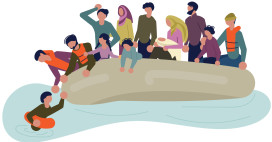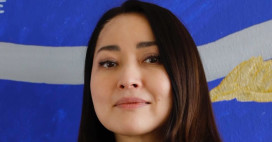
On this page
The European Impacted Persons Advisory Council (EIPAC) is an advisory committee composed of people with lived experience in various aspects of the criminal legal system who are committed to supporting the reform of the system. Formed in 2024 as an advisory body to Fair Trials Europe, EIPAC ensures that the voices of impacted persons shape policies, campaigns, and the Fair Trials advocacy efforts. This is “EIPAC Voices: Stories of Lived Experience in Justice Reform” a monthly blog series, introducing EIPAC members and their personal experiences.
The Email that Changed Everything. Germany, 2022
It was a warm day at a metro station in Hamburg. I had just dropped my fiancé off on her way to the airport, still overwhelmed with joy from reuniting with my mother after ten long years. I had been forced to leave my family in Syria as a teenager, and the thought of finally being together with her again felt surreal. On my way back to my relative’s house, I received an unexpected email from the Greek Asylum Service that shattered the brief moment of normalcy. It felt strange. It was August, typically a holiday break for institutions, and even more unusual was the fact that the Greek Asylum Service initiates communications with individuals.
I opened the email suspiciously. At first glance, I thought it might be a work-related message, as someone working with humanitarian organizations that support refugees with legal and social assistance in Greece, I often received those files.
But the email was empty, except for an attached file titled “Process of Asylum Revocation.” My heart raced. “It’s a scam,” I reassured myself.
You’re a national threat, read the email. The words swirled in my mind, sending chills down my spine and leaving me paralyzed.
It couldn’t be real. I had just renewed my asylum documents, been accepted into a prestigious leadership program overseas, and received one of the most difficult visas granted for holders of refugee travel documents.
It couldn’t be real. My entire purpose in staying in Greece was to create a sense of belonging, improve conditions for refugees, and revive the long history of shared culture between Greece and Syria. How could this be possibly true?
Suddenly, the streets of Hamburg felt overwhelming. My whole body started to remember the horrible lived experiences under the oppressive Assad regime. Paranoia took hold. I lost my way in the metro, surrounded by ordinary people, police officers, and tourists. It felt as if everyone knew about the email. I was terrified that someone might recognize me, confront me, and that I would be taken away again to some police facility where torture awaited.
I couldn’t return home to my mother. The last time she saw me, I was covered in bruises after being tortured at the Iranian embassy in Damascus. The thought of her knowing my fear was unbearable. The past I thought I had escaped was now creeping back in.
“Us versus Them”. Syria, 2011-2013
My relationship with authority began in my home country, Syria. Growing up under the Assad regime, I witnessed firsthand the brutality of the police and military. I was arrested in 2011 for a week at Al Mazzeh Military Airport, where I endured torture and humiliation. As a young male from Darrya, I faced constant threats, particularly as the regime intensified its crackdown on dissent. The situation escalated, and heavy military attacks forced many of us, including myself, to flee the country. In November 2012, I sought refuge in Lebanon.
Life in Lebanon was filled with uncertainty and fear. I worked multiple jobs to survive, but the trauma of my past haunted me. My encounters with authority were marked by discrimination, reinforcing the mistrust I had developed. I lived with the constant fear of being targeted due to my background and the stigma associated with being a young male refugee from Syria.
You’re a national threat. The words swirled in my mind, sending chills down my spine and leaving me paralyzed. It couldn’t be real.
In 2015, I went to Greece, hoping to find safety and a fresh start. But my initial experiences with police treatment of refugees were jarring. I was pushed back twice while trying to cross borders, facing harsh treatment that deepened my anxiety. I spent 13 days in a cell at Evzoni police station, stripped of my dignity while waiting for a single piece of paper that merely informed me I could stay in the country for six months, before being forced to leave. Time and again, I was stopped, strip-searched, and detained for hours without any conviction or clear reason other than being a young, Arab-muslim-refugee-looking male.
Despite this, I was determined to move forward. I immersed myself in humanitarian work, striving to bridge the gap between refugees, the authorities, and society. I wanted to challenge the prevailing narrative of Us versus Them. With each interaction with the police, I began to reclaim my agency, pushing past the anxiety that came with being questioned or detained. I found a renewed sense of purpose in my work because I wanted to rewrite my story, transforming it from one of victimhood to one of resilience.
Asylum and Corruption, Corruption and Asylum. Greece, 2022
The days passed but the email continued to weigh heavily on my mind. I had fought hard to gain asylum status and build a life in Greece, but after that message everything felt precarious. Being labeled a national security threat was not just a false accusation, it was a painful reminder of the systemic injustices refugees like me continue to face. The email cited a classified document received by the Greek Asylum Service as the reason for revoking my status. No details were provided. No opportunity to defend myself against these unknown allegations. The fear of losing everything I had worked for consumed me.
Over the next few months, I worked diligently with legal support to appeal the case. Twice I was denied access to the classified documents that led to the decision to revoke my refugee status. I lost the case with no further justification. I even submitted a letter of explanation to the Greek Asylum Service and the Ministry of Migration, detailing my seven-year contribution to society. I also gathered a petition signed by 1,008 people, addressed to the Prime Minister, urging the retrieval of my asylum. It didn’t matter. I also highlighted that the revocation was illegal and unconstitutional, as it was based on anonymous allegations with no transparency or evidence.
I was pushed to seek asylum somewhere else, a move I had hoped never to make again. I felt, and still feel, like “a man with no land,” stripped of the safety I had fought so hard to attain. I’m Syrian, and I cannot go back to my country. I thought Greece was my second home but they expelled me from their lands.
The email was a stark reminder of how fragile anyone’s existence can become. After spending years trying to overcome the fear of being interrogated or detained, I found myself in an even worse position, facing the loss of my asylum status due to arbitrary decisions made by those in power. That loss felt like a betrayal.
The Cycle of Fear and Resilience. No Land, 2025
When the paranoia faded that day of August in Hamburg and common sense returned, I reflected on the surreal situation: I had been selected for a prestigious program across the Atlantic, yet I was considered a national threat by a country I had spent seven years working for the common good?
“You can take my paper away, but you can’t take society out of me”.
I felt, and still feel, like “a man with no land”. I’m Syrian, and I cannot go back to my country. I thought Greece was my second home but they expelled me from their lands.
The journey of being a refugee is a journey of resilience. I believe in the power of storytelling to challenge the narratives imposed upon us. Our stories can inform, educate, and inspire change. No one should be treated as a threat based on false stereotypes. And no one should be left in limbo, waiting for answers that may not come. Three years have passed since my case began, and I still have no clarity on why my asylum was revoked. Yet, out of this darkness, I found a light.
I have graduated from my program and enrolled at university to continue the studies that were interrupted back in Syria and I work as a counselor and advisor. I managed to find a new path after my asylum was taken from me.
But, what about other refugees who don’t have that chance? What about those under persecution in their countries? Who will protect them?
Author: BW
Article edited by: Ángela Rodríguez, Fair Trials’ Communication Officer.
As part of our commitment to centering impacted voices, Fair Trials will feature a monthly blog series, “EIPAC Voices: Stories of Lived Experience in Justice Reform,” introducing EIPAC members and their personal experiences. These stories highlight the human cost of justice system failures while reinforcing the need for fairer, more rights-based approaches to justice.


